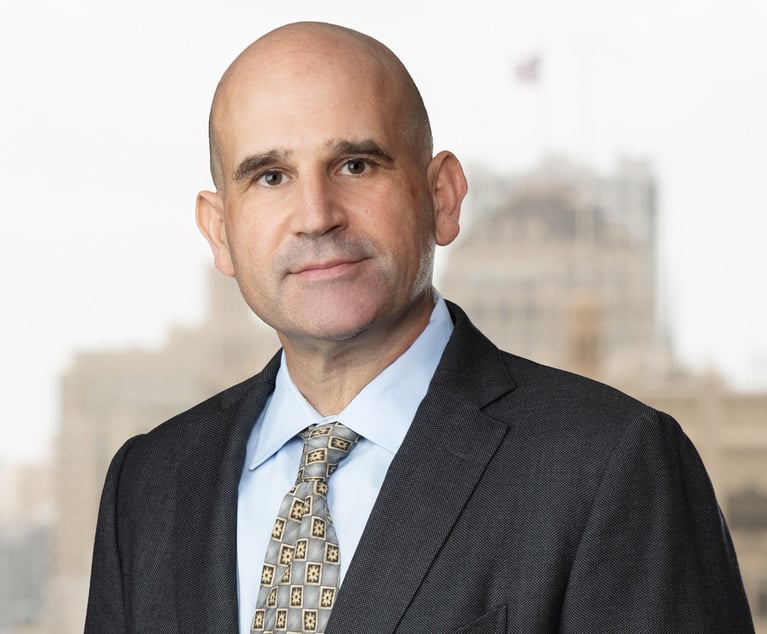 Rick Hasen, Chancellor's Professor of Law and Political Science at the University of California, Irvine.
Rick Hasen, Chancellor's Professor of Law and Political Science at the University of California, Irvine.UC-Irvine's Rick Hasen on the Threat to U.S. Elections (Hint: It's Not Just Russia)
The election law expert discusses security risks going into the 2020 election.
August 28, 2019 at 12:00 PM
5 minute read
The original version of this story was published on National Law Journal
Robert Mueller, the special counsel who investigated Russian interference in the 2016 presidential election, emphasized that the interference in the 2016 presidential election was not a one-off event. "They are doing it while we sit here. And they expect to do it during the next campaign," Mueller said in his congressional testimony in July. A 61-page report from the Senate Select Committee on Intelligence sketches out just how helpless a local election IT staffer is against "Russia's cyber army."
Rick Hasen, chancellor's professor of law and political science at the University of California Irvine School of Law says Congress likely won't be passing election interference legislation on a federal level. Instead, the United States' counties and states are all that's between the 2020 presidential election and Russia's horde of hackers.
Alaina Lancaster, the author of the weekly legal futurist newsletter What's Next, spoke with Hasen about the legal roadblocks and threats facing the nation's voting infrastructure. The conversation has been edited for length and clarity.
What are some of our biggest election interference threats?
If you think about the 2016 election, we saw three different kinds of interference. The first was the intrusion into voter registration databases, which was the subject of the recent Senate report that shows that Russian government agents and others at least probed the election systems of likely all 50 states. These are not the systems that would count votes, but they keep records of people who are eligible to vote. So, the concern is that someone can mess with the voter registration databases or hold it hostage. Under this category, another potential form of interference is with other parts of infrastructure, such as the electrical grid or disruptions that could mess with Election Day. The second was the hacking of emails from the Democratic National Committee and other Democrats, and the release of politically embarrassing information. That's certainly something we could see again, and it wouldn't necessarily be done only to favor President Donald Trump or by Russian government agents. The third kind of threat that we saw in 2016 was social media manipulation, trying to use the polarization of American society to further drive wedges between the parties and ultimately try to help Trump get elected.
What makes our voting infrastructure particularly vulnerable?
The fundamental piece of information you need to understand the threat is that our election system in the United States is highly decentralized. This is unusual in advanced democracies. Usually the national government would be the one conducting the election on uniform machinery with uniform standards. Instead, the states have primary responsibility for running even federal elections, and that power is often devolved to counties. So not only are there variations between states, there are variations within the states. Those who are trying to prevent hacking and other forms of interference have to be aware of not one system, or even 50 systems, but thousands of systems with thousands of potential points of vulnerability. Some of those places that run elections are going to be resource-starved counties without adequate staffing or money to deal with the threat of a concerted attack from a foreign adversary.
Are there any legislative proposals to create a more centralized system?
There's been a tremendous amount of resistance on the Republican side to centralization. There's even resistance from some quarters toward assistance from the federal government out of a belief that the Department of Homeland Security's recognition of the voting process's critical infrastructure was a power grab. We did have Congress pass some legislation that would provide additional funding to upgrade voting machinery to make it less susceptible to interference. Additional proposals, for which there has been bipartisan support, have been blocked in the Senate by [Majority Leader] Mitch McConnell. So, it's unlikely that we'll see further significant legislation before 2020.
We're seeing things happening state by state in places like Georgia and Pennsylvania, which had among the most insecure voting systems, moving to adopt new voting machinery. And the federal government's primary role has been the provision of extra funding and expertise from the Department of Homeland Security. As a nontechnical person, it's hard to know if what the federal government is offering is adequate and helpful beyond what the states can do for themselves.
What lawsuits are you watching that could shape this area of the law?
One of the most important lawsuits is ongoing in Georgia, where there's been a fight over the security of voting machines. Georgia announced that it's going to buy a brand-new voting system, and some of the groups involved in the ongoing litigation are not satisfied that the new system is sufficiently secure. There's a divide among election reform and integrity proponents as to whether this newest wave of voting technology, which uses ballot marking devices, is secure enough. What these machines do is print out a QR code or bar code, as well as the names of candidates and ballot measures that the person voted for, on a printed receipt. When the ballots are counted, the code is scanned. The question is whether that machine-readable code, which is the basis for the vote count, is secure enough. Opponents say we don't know what's behind the code. I expect we'll hear something in relatively short order on this litigation, because the plaintiffs are trying to prevent the use of old machinery next year.
This content has been archived. It is available through our partners, LexisNexis® and Bloomberg Law.
To view this content, please continue to their sites.
Not a Lexis Subscriber?
Subscribe Now
Not a Bloomberg Law Subscriber?
Subscribe Now
NOT FOR REPRINT
© 2024 ALM Global, LLC, All Rights Reserved. Request academic re-use from www.copyright.com. All other uses, submit a request to [email protected]. For more information visit Asset & Logo Licensing.
You Might Like
View All
How the Deal Got Done: Sidley Austin and NWSL Angel City Football Club/Iger

How Uncertainty in College Athletics Compensation Could Drive Lawsuits in 2025

How I Made Practice Group Chair: 'Think About Why You Want the Role, Because It Is Not an Easy Job,' Says Aaron Rubin of Morrison Foerster

Outgoing USPTO Director Kathi Vidal: ‘We All Want the Country to Be in a Better Place’
19 minute readTrending Stories
- 1Recent Decisions Regarding the Telephone Consumer Protection Act
- 2The Tech Built by Law Firms in 2024
- 3Distressed M&A: Mass Torts, Bankruptcy and Furthering the Search for Consensus: Another Purdue Decision
- 4For Safer Traffic Stops, Replace Paper Documents With ‘Contactless’ Tech
- 5As Second Trump Administration Approaches, Businesses Brace for Sweeping Changes to Immigration Policy
Who Got The Work
Michael G. Bongiorno, Andrew Scott Dulberg and Elizabeth E. Driscoll from Wilmer Cutler Pickering Hale and Dorr have stepped in to represent Symbotic Inc., an A.I.-enabled technology platform that focuses on increasing supply chain efficiency, and other defendants in a pending shareholder derivative lawsuit. The case, filed Oct. 2 in Massachusetts District Court by the Brown Law Firm on behalf of Stephen Austen, accuses certain officers and directors of misleading investors in regard to Symbotic's potential for margin growth by failing to disclose that the company was not equipped to timely deploy its systems or manage expenses through project delays. The case, assigned to U.S. District Judge Nathaniel M. Gorton, is 1:24-cv-12522, Austen v. Cohen et al.
Who Got The Work
Edmund Polubinski and Marie Killmond of Davis Polk & Wardwell have entered appearances for data platform software development company MongoDB and other defendants in a pending shareholder derivative lawsuit. The action, filed Oct. 7 in New York Southern District Court by the Brown Law Firm, accuses the company's directors and/or officers of falsely expressing confidence in the company’s restructuring of its sales incentive plan and downplaying the severity of decreases in its upfront commitments. The case is 1:24-cv-07594, Roy v. Ittycheria et al.
Who Got The Work
Amy O. Bruchs and Kurt F. Ellison of Michael Best & Friedrich have entered appearances for Epic Systems Corp. in a pending employment discrimination lawsuit. The suit was filed Sept. 7 in Wisconsin Western District Court by Levine Eisberner LLC and Siri & Glimstad on behalf of a project manager who claims that he was wrongfully terminated after applying for a religious exemption to the defendant's COVID-19 vaccine mandate. The case, assigned to U.S. Magistrate Judge Anita Marie Boor, is 3:24-cv-00630, Secker, Nathan v. Epic Systems Corporation.
Who Got The Work
David X. Sullivan, Thomas J. Finn and Gregory A. Hall from McCarter & English have entered appearances for Sunrun Installation Services in a pending civil rights lawsuit. The complaint was filed Sept. 4 in Connecticut District Court by attorney Robert M. Berke on behalf of former employee George Edward Steins, who was arrested and charged with employing an unregistered home improvement salesperson. The complaint alleges that had Sunrun informed the Connecticut Department of Consumer Protection that the plaintiff's employment had ended in 2017 and that he no longer held Sunrun's home improvement contractor license, he would not have been hit with charges, which were dismissed in May 2024. The case, assigned to U.S. District Judge Jeffrey A. Meyer, is 3:24-cv-01423, Steins v. Sunrun, Inc. et al.
Who Got The Work
Greenberg Traurig shareholder Joshua L. Raskin has entered an appearance for boohoo.com UK Ltd. in a pending patent infringement lawsuit. The suit, filed Sept. 3 in Texas Eastern District Court by Rozier Hardt McDonough on behalf of Alto Dynamics, asserts five patents related to an online shopping platform. The case, assigned to U.S. District Judge Rodney Gilstrap, is 2:24-cv-00719, Alto Dynamics, LLC v. boohoo.com UK Limited.
Featured Firms
Law Offices of Gary Martin Hays & Associates, P.C.
(470) 294-1674
Law Offices of Mark E. Salomone
(857) 444-6468
Smith & Hassler
(713) 739-1250






